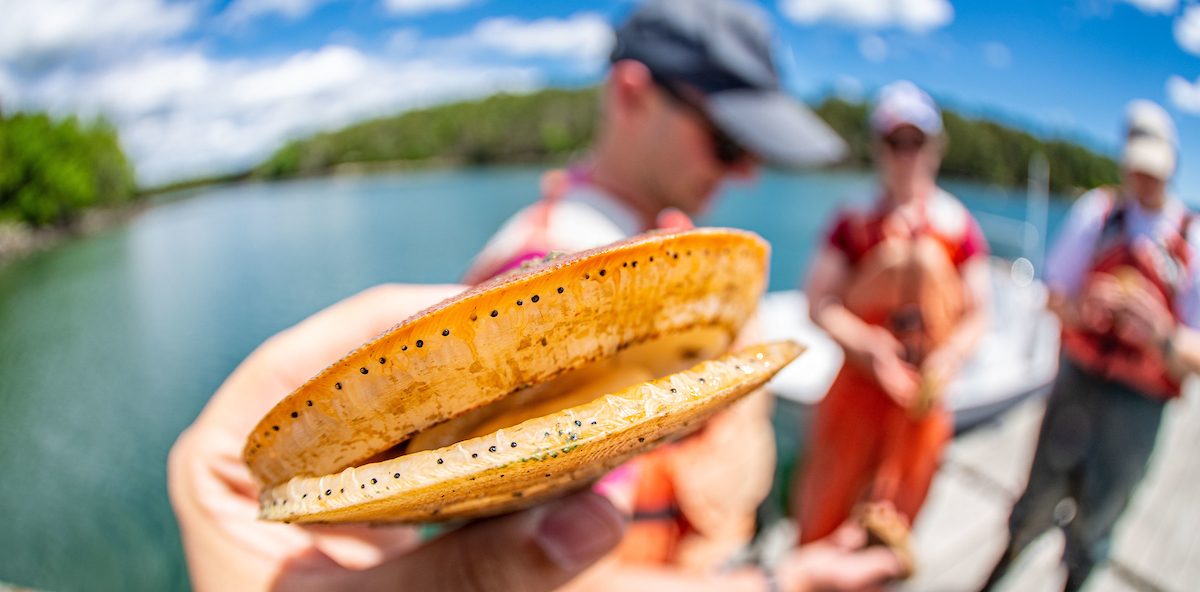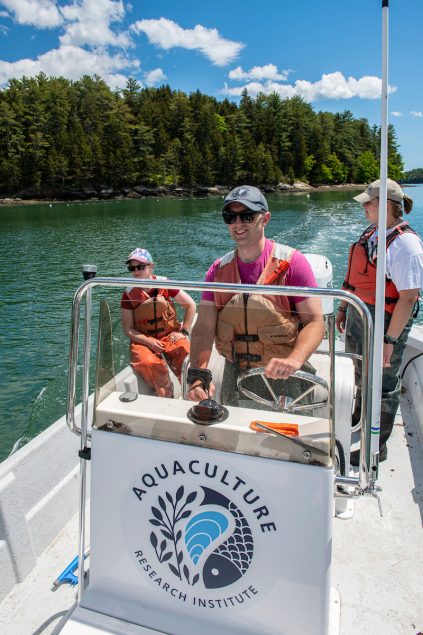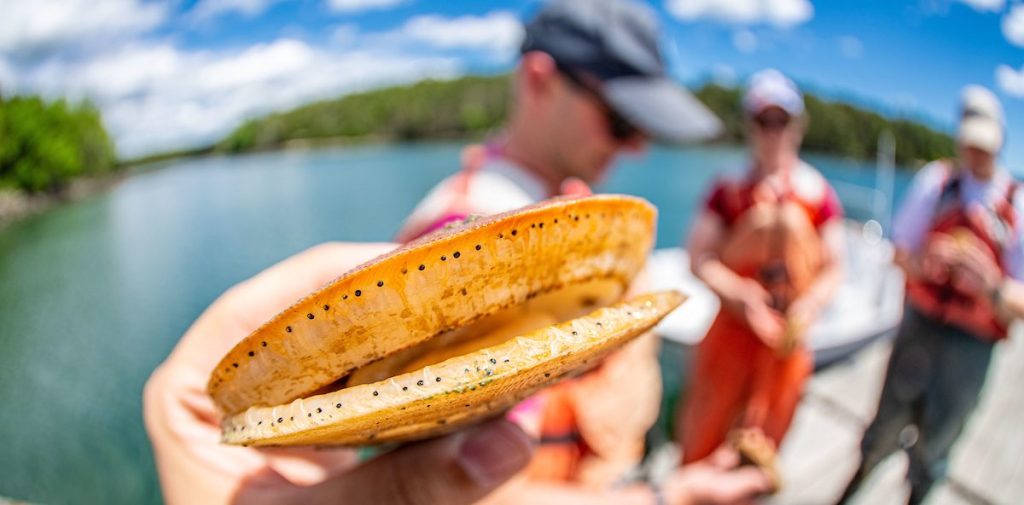M.S. and Ph.D. in Aquaculture and Aquatic Resources

The graduate program in Aquaculture and Aquatic Resources is designed to train professionals for a career in aquaculture and related industries or for further academic training. The M.S. and Ph.D. degrees are intended to have a strong basis in the biological and/or physical sciences with additional training and research opportunities in areas such as aquatic health, physiology and nutrition, aquaculture production, engineering, food science & technology, social sciences, policy and economics.
The Program Faculty come from multiple disciplinary areas including engineering, pathology, physiology, nutrition, seafood processing and population and habitat modeling. Faculty work with a variety of aquatic species including, but not limited to: cod, halibut, salmon, trout, oysters, clams, mussels, sea urchins, sea horses, abalone, seaweed, and lobsters.
Consideration for admission to the M.S. program will be given to applicants holding a bachelor’s degree from an accredited institution or the equivalent in one of the general areas of biology, animal science, food science, nutrition or engineering. Admission to the Ph.D. program requires a master’s degree or equivalent in a science-related discipline with prior research experience. Applicants are expected to have at least a 3.0 grade-point average. Scores from the Graduate Record Examination aptitude test (GRE) will be evaluated along with undergraduate transcripts and references from persons knowledgeable of the student’s academic potential and work ethic. Since admission into the program depends on obtaining a suitable faculty advisor, interested students should begin the application process by first contacting potential faculty advisors to find out if they anticipate accepting new students. If an Aquaculture and Aquatic Resources faculty member encourages you to apply, indicate the faculty member’s name and your proposed research area in your application’s Statement of Purpose. Once submitted, the completed application will be considered by a five-member Program Committee representing at least three of the participating units.
Upon admission, a program of study is planned by the student in consultation with the student’s advisory committee. Courses are selected from the graduate offerings of all University of Maine Departments. The interests, background courses, and future needs of the student will be considered in course selection. The student will participate in a research project developed in consultation with the advisory committee.
We accept applications throughout the year. Prior to applying, please directly contact faculty whose interests are similar to yours to discuss possible research and coursework. Be sure to contact the program coordinator prior to submitting an application.
Students successfully completing either of this PhD/MS program will be able to demonstrate the following: Understand, interpret, shape, and augment the knowledge base by:
● Students will demonstrate an advanced level of knowledge of a relevant area of aquaculture or aquatic resources. Assessment: Initial literature review, thesis and thesis defense
● Students will be able to use critical thinking skills to create an appropriate literature review relevant to the specific project. Assessment: Initial literature review, thesis and thesis defense
● Students will identify knowledge gaps and will offer suggestions that contribute to/augment/shape the relevant area of aquaculture or aquatic resources. Assessment: Initial literature review, thesis and thesis defense
● Students will develop and implement a research plan that addresses research questions and/or hypotheses. Assessment: thesis plan
● Students will demonstrate competence in the synthesis and analysis of quantitative/qualitative data. Assessment: completion of appropriate statistical or experimental design course (such as PSE509 or FSN 524) and thesis
Share disciplinary expertise openly, effectively, and accurately by:
● Students will effectively communicate (oral/or written) their research plan and results to various audiences. Assessment: Completion of appropriate seminar courses such as AVS633 or SMS691, conference abstracts and/or journal manuscript acceptance (PhD requirement is at least one co-authored, accepted, original manuscript)
Demonstrate responsible and ethical practice by:
● Students will be able to articulate the fundamental elements that constitute Responsible Conduct in Research as it applies to aquaculture or aquatic resources. Assessment: Satisfactory completion of UMaine required courses (INT601 or similar)
Should I apply immediately?
No! Please ensure you have and advisor, a project and funding BEFORE you apply. Otherwise, I will reject your application and you will have wasted the application fee.
What do I need to have in order to submit an application?
You need to have identified a faculty advisor willing to advise through your studies. There is an affiliated faculty list available on the website. You will need to have identified a project, in discussion with your faculty advisor. You will need to have identified appropriate funding to cover your stipend, your tuition costs, your health insurance costs, and your research costs.
Do you have funding to support me?
No! The program is small. We do NOT have internal funding for any students, so do not ask. The usual path is to find an advisor who has funding for a graduate student. Advisors are NOT required to inform the program if funding is available. Alternatives are to apply for a Graduate Fellowship (you usually need an undergraduate GPA of >3.6) or self-fund. The Graduate School will need to confirm you have enough money to support yourself for at least 12 months if you self-fund.
Why do I need a project?
Our program is thesis-based, you will need to complete a thesis, and defend it, in order to complete the program. You need to identify a project before applying.
Can I apply for a PhD?
If you have a Masters degree already you can apply for admission straight to PhD. If you don’t, you will need to apply for a MS first. If your committee think you are a suitable candidate to progress, we can add you to a PhD track after 2 years.
What are the minimum academic requirements for application?
You should have a GPA of at least 3.0 to apply. While we do have applicants with a lower GPA, it usually indicates that an applicant could struggle with the graduate academic program. Such applicants, assuming the advisor supports their application, will need to come in on a ‘conditional’ acceptance. This requires the student to complete the first 9 course credits, at 500 level, with a minimum GPA of 3.0 for each course. These credits must be course credits (with a syllabus) and not independent study credits, or similar.
Can I apply for a September start?
We have a rolling admission program. That means, that once accepted, you will begin your coursework the semester after your admission. International students usually have longer time periods before admission, to ensure are able to obtain entry visas etc.
Can you send me a list of faculty with funding?
No, affiliated faculty are not required to inform the program of available funding. There is a list of affiliated faculty available on the website.
Are GREs required?
We review applications holistically. We look to ensure that prospective students can operate, academically, at the graduate level. If English is not your first language you need to show that your English proficiency is sufficient for you to complete your studies, which will be taught in English.
How is my application reviewed?
In the first instance, the Graduate School will ensure that your application contains all the necessary elements to permit a review, including previous transcripts, personal statement and letters of recommendation. Then the application is reviewed by our Graduate Review Committee to ensure it meets our standards. Finally, if you are self-funding, the Graduate School will ensure you have enough funding in place to proceed.
How long will it take to get a MS or PhD?
For full time students the minimum is usually 2 years for a MS and 4 years for a PhD. The Graduate School does have maximum timeframes. Part-time study is available and will usually take twice as long.
How long does it take to review applications?
If all the elements (advisor, project and funding) are in place the review process usually only takes a couple of weeks. Domestic students can usually start in a matter of weeks following acceptance. International students will require visas etc. before they can start.
Do I need to be resident in Orono?
Physical presence on campus is NOT a requirement. It is possible to complete the program remotely, assuming your advisor is agreeable. Finding and completing the necessary course credits can be a challenge. We have had student complete their studies remotely.
For more information contact:
AAR Graduate Coordinator, Dr. Timothy Bowden
timothy.bowden@maine.edu
207.581.2772
Click Here for List of all Affiliated Faculty!




